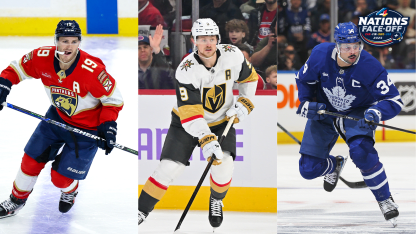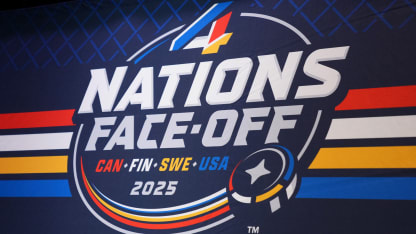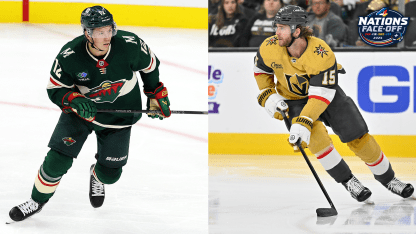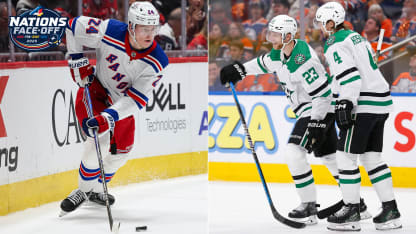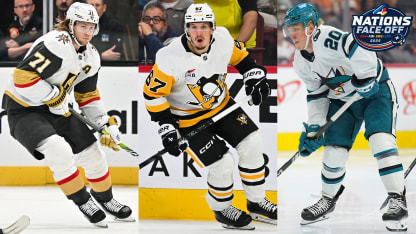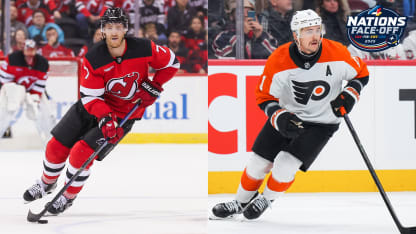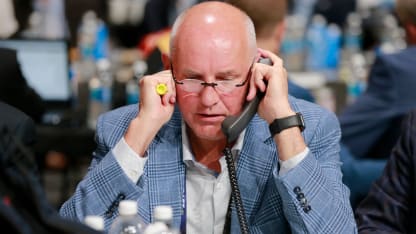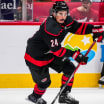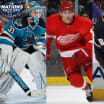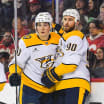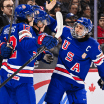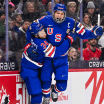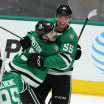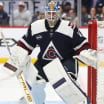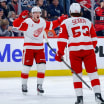In NHL.com's Q&A feature called "Sitting Down with …" we talk to key figures in the game, gaining insight into their lives on and off the ice. With the rosters for the 4 Nations Face-Off set to be revealed Wednesday, this week we feature former United States and New York Rangers goalie Mike Richter, who played for the United States at the international level 10 times in his career, including winning gold at the 1996 World Cup of Hockey and claiming silver at the 2002 Winter Olympics.
Richter talks 4 Nations Face-Off, international experiences in Q&A with NHL.com
Former Rangers goalie won gold with U.S. at 1996 World Cup of Hockey, silver at 2002 Salt Lake City Olympics
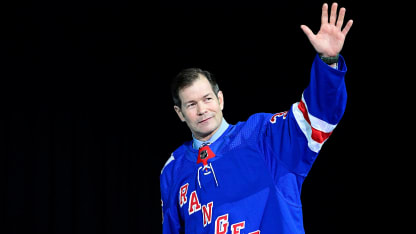
© Getty Images
NEW YORK -- Mike Richter is the last goalie to win a gold medal for the United States in a best-on-best tournament.
It happened in 1996 at the World Cup of Hockey, when the U.S., backstopped by Richter and his .923 save percentage, won six of seven games, including a best-of-three finals against Canada to claim gold. Richter was named the tournament's most valuable player.
Richter, the former New York Rangers goalie, is hopeful that the United States' next great achievement in international hockey will come in February when it competes against Canada, Sweden and Finland in the 4 Nations Face-Off.
The tournament will run from Feb. 12-20 in Montreal and Boston. It's the first best-on-best tournament since the World Cup of Hockey 2016 in Toronto, which was won by Canada.
Rosters for the four competing nations will be revealed Wednesday.
Players selected to represent Finland and Sweden will be announced during a live show produced by NHL Network and made available globally. ESPN will also announce the remaining players representing Finland and Sweden during the 2 p.m. ET edition of SportsCenter.
At 6:30 p.m. ET, the balance of rosters for Canada and the United States will be announced during live pregame shows on Sportsnet and TNT leading into doubleheaders on each network.
Each country announced the first six players to its roster in June.
Richter, now a 58-year-old die-hard fan of the game, is thrilled that best-on-best hockey is back.
That, more than anything, came through in his energetic 10-minute conversation with NHL.com at the NHL Shop NYC before a game between the Rangers and New Jersey Devils at Madison Square Garden on Monday.
Best on best again. As the last U.S. goalie to win a gold in a best-on-best tournament, what are you looking forward to and what are you expecting, particularly from Team USA?
"The first thing I'd say is thank God they're doing it. As a fan, as a player, you want to be in those tournaments. You have the added responsibility and respect and just honor of putting your country's jersey on. We all talk about it in the same kind of way, but it's true. I mean, you have your pride, if nothing else, and you want to beat everybody across from you, but I think the best part about it as a player and as a fan is you are truly seeing the best of the best that are motivated to play well. You scrape everything off and you give them space to actually focus on it, you're going to get some amazing hockey. I think sports, when you really can't predict the outcome, it's compelling, right. It's a 1-1 game in the last two minutes, you have to sit in your chair and watch this thing. Overtime too. That's why you do it. And every game in this tournament is going to be like this.
"The Finns have an excellent team. The Swedes have an excellent team. Of course, you know Canada and the U.S. do too. When you look at these international competitions, whether it's World Juniors, which we have coming up, or the Olympics in a little less than two years, there's probably five or six teams that legitimately go in there and say, 'We can win the gold.' And it's a short tournament so it's a sprint. There's no, 'We'll get this together at some point.' So you're going to see the best in the world playing with a lot of pride against the best in the world with everything on the line. It's a great tournament."
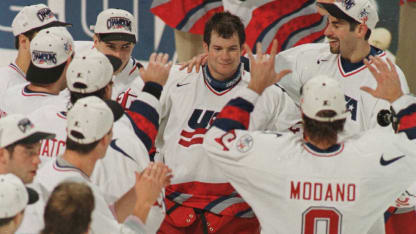
© Glenn Cratty/Allsport
If you think about the U.S. goalie situation you have Connor Hellebuyck, Jake Oettinger, Jeremy Swayman and we can go on down the list because Anthony Stolarz has been very good and so has Joey Daccord, and Thatcher Demko probably would be if he weren't hurt. What does that mean for the United States in your mind to go into a tournament and you don't know who the No. 1 is but you know it is a No. 1 goalie?
"Yeah, actually you have almost an abundance of riches there that makes it difficult. When you have one or two guys you know what you're doing and just whoever is hot you go with. In the end you want to do the same thing in this tournament, but you also want to give everybody a look and it's really hard to do. So, as we are playing right now, these guys also have an eyeball toward thinking, 'Let me play my best, let me get myself prepared for this,' and then it's just whoever is in a good rhythm at the time because you want to hit the ground running. You have to hit the ground running. You can't lose a game. You can't lose a period. You're going to be behind the eight ball if you do. It's a bit unfair, but you see Canada in the past had the same issue, right. They had too many guys and only one net. But the good news is when you have depth, and the U.S. has depth, if someone gets hurt or has a hiccup it doesn't mean they're a bad goalie it just means today is not your day. I was just talking with Marty (Brodeur) about the Olympics in 2002. 'CuJo' (Curtis Joseph) lost the first game and Marty had to come in. Pretty nice to have Marty fill in for 'CuJo.' So, when you have that much firepower between the pipes, I'd say just be prepared to use it all."
Previewing the roster reveals for 4 Nations Face-Off
What is it like to go into these tournaments, these short tournaments, with players you're not familiar playing with?
"Communication is key. You really have to have it. I was lucky because Brian Leetch was on every team I think I was ever on since I was about 15 and we knew each other well. The U.S. had a kind of small group of guys that had played together a lot, so the communication was really good. We had a bit of an older team in 2002, but when I think about 1996 it was the same kind of group and with the influx of the Billy Guerins and Keith Tkachuks, who were amazing players and added so much energy. But one of the keys for this particularly with the defense and goaltenders for any team is to just gel as quick as possible. So the personality types really matter and we meshed so well. It was like one day and we knew each other for life. It was crazy. That's going to make a big difference. But you look, most of these guys have played together. If you look at the Swedes and Finns in particular, they know each other. It might be a little different for the U.S. and Canadian players because there's a bigger field to choose from so they might not all be familiar with each other."
When you knew there was a best-on-best tournament coming in the season, and for you that would be the Olympics since the World Cup was played before the season, did you feel the motivation to play well because of that or was it just for your NHL team?
"Oh, 100 percent. I mean, these are career-defining moments. They're bits in a season but they have a ton of pride. I think it's so cool that you're able to do it in the middle of the season like this. It's not easy. The brass of the League had to roll up their sleeves and figure it out. It's hard for the guys who won't be playing but it's hard for the guys who will be playing. It's a lot of wear and tear, but I think for the game of hockey it's unbelievable. All in all, it's 100 percent worth it. And for the players playing it's a real privilege. Back in '96 when we did win, when we came to training camp at the end of July, early August, we were still beaten up from the season before because that's your crucial time to lick your wounds, have some family time and get back at it, but honestly it was made very apparent that it was a privilege to play in the tournament, that there's 20 seats in this locker room and if you're not fully in then get out, there's the door. Most players really take that approach because it's such a level of responsibility for you to take up that spot that you better make the most of it. There are 10 other people who would kill for it."
You have both perspectives of preparing for a tournament, the Olympics, in season and preparing for a tournament, the World Cup, that started before the NHL season. Which was easier to handle in terms of preparation?
"I actually thought in some ways the summertime because you're preparing for this high-end tournament and that's your team, so you don't have to cut the cord from what you've been doing, you just prepare for that as your season. It's OK, when that ends, it's time to go on, but you're already at a high level going into your regular season. I liked that a lot. It was difficult in the Olympics because we were in a battle to make the playoffs and every bit of your focus is on that, every point matters. What I feel comfortable about is I never had to change what I was doing. The better I played for the Rangers, the more prepared I was for Team USA. So, you can meld those two motivations together. And, honest to God, I had blown out my knee the year before and I was recovering from surgery in the spring of 2001, and I got a call from Herb Brooks. He asked how I was doing, if I needed help, and told me what he was thinking about the team. But he also said, 'You'll see (Mike) Modano, you'll see Leetch, and when you see those guys please, tell them, one more pushup, one more sprint, because we're going to need to hit the ground running.' We knew we weren't going to out-talent any team, we were as talented as anybody, but we needed to be disciplined and we needed to be in shape and we needed to outwork everyone. He was really saying that it mattered more than ever in 2002 because the level of competition, as it is now, it only gets better it seems, is so tight that the team that is going to win is the team that's going to play together better, gel together better, has the discipline and outworks the next guy."
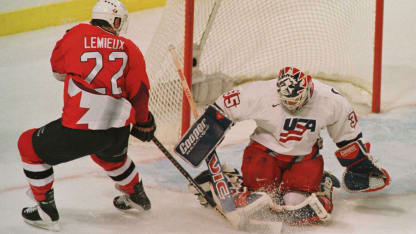
© Glenn Cratty/Allsport
But how hard is it to gel together when you don't have much time? There will be two days of practice for the teams in the 4 Nations before the first game is played.
"That's a skill. Honestly, putting these teams together, it's probably back in the coach's mind. Like, this guy is a great glue guy, do you want him in the locker room. Nobody on that team can't skate and play the game of hockey. How are they personality-wise matters."
Jonathan Quick used to be Team USA's No. 1 goalie. Now he's not that anymore, but he is two wins away from 400 for his career. What is your level of appreciation for what Quick has done in his career, but maybe more to the point how he has essentially resurrected his career to have a second lease on it as a backup in New York?
"I cannot say enough things about this guy. His career in itself has been amazing, but like you said, he's resurrected it too. I can't remember how many wins he had last year with the Rangers (18), but he got the Rangers 30 points or something like that. Really important points. And that's such a difficult position to be in. Igor Shesterkin is an amazing goalie, but when you get tapped to play that game it's an important win to get and he did nothing but play professionally. So, you know he's preparing like a madman for that time, and then he comes out, and this guy is stealing games like every time the guy plays. I mean, how lucky are we as sports fans that we get to see Shesterkin and Quick play. They're two of the best to ever play the game. And, Quick, he's quietly put together this career. When the Rangers went to the Stanley Cup Final against him in 2014, we had Henrik Lundqvist and we all know how great he is. I knew how good of a goalie Quick was, but after that first game, the way he played, it was like, 'Oh my God, our advantage has diminished, it's gone, because this guy between the pipes on the other end is sensational.' So now you start going, 'Well, OK, are we better on the blue line? Do we have enough speed? Do we match up?' I don't think people still fully appreciate how good he is. He's just a quiet guy that goes about his job, but he doesn't just win games, he can win games single-handedly. That's amazing when both goalies on the Rangers can do that. It's part of the reason that they're a fairly stable team even though they've run into a skid now that hopefully they seem to be coming out of. They're stable because they're so good on the back end."
